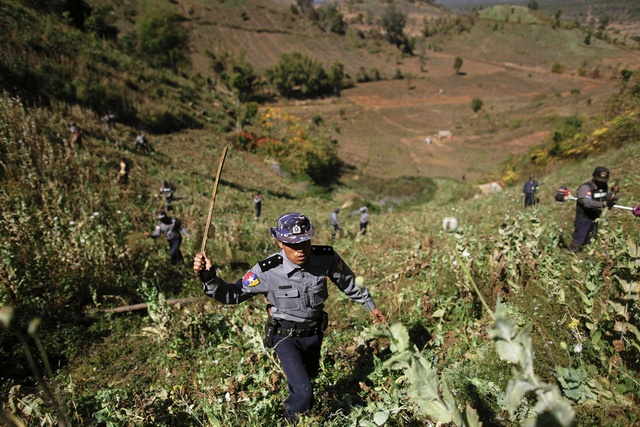In eastern Burma, efforts are underway to hamper opium production in Shan State, which, combined with adjacent parts of Laos and Thailand, produces a staggering 18 percent of the world’s opiates. Crop substitution schemes currently being implemented in three townships are unlikely to spread to other areas without a cash injection.
A governmental Central Committee for Drug Abuse Control (CCDAC) has partnered with the United Nations Office on Drugs and Crime (UNDOC) to face the problem, which has far reaching effects for poor, ethnic minorities in the remote area. Poppy substitution is already being piloted in Hopong, Loilen and Panglong townships.
Jason Eligh, UNODC Country Manager for Burma, told DVB on Friday that he believes about US$7 million has been spent over the past three years on poppy substitution in Shan State. Considering that CCDAC secretary Kyaw Kyaw Tun has reportedly requested projects in six other townships — Mongnai, Mongpan, Pinlaung, Pekhon, Langhko and Mongton – an effective course of action will come at a hefty price.
“That is not enough money at all” said Eligh of the US$7 million already granted by the UNODC.
[related]
An enormous sum would be necessary, he said, for a comprehensive substitute scheme that would canvass all of Shan State, which has nearly 60,000 hectares of poppy fields for a massive drug-producing industry that involves or affects about 200,000 households.
“I don’t think it should come as any surprise to say we need 15-20 million a year for 10 years,” he said.
Eligh explained the nuances of tackling the country’s drug trade during an exclusive interview with DVB in January, noting that Burma faces unique challenges because so many ethnic groups – armed, unarmed, ceasefire observing and otherwise – will all have to reach agreement with the central government in order to effectively implement eradication schemes.
The Shan State Army-South’s (SSA-S) Anti-Narcotics Force Chief, Col Hseng Harn, said the group signed a 2012 agreement for cooperation with the government and the UNODC to eliminate drugs, which established a platform for poppy-substitution programs in Mongnai and Mongpan townships that have not yet begun.
The SSA-S said the agreement included nine agenda points, but only two of them — the appointment of liaison officers and the conducting of field trips — have been implemented due to lack of further communication from the government.
According to the UNODC, last year 57,800 hectares of land were used for poppy cultivation in Burma, yielding 870 metric tons of raw opium.



